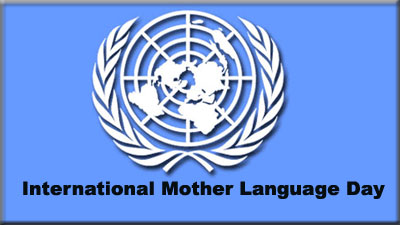International Mother Language Day (IMLD) is observed every year by member states of the United Nations Educational, Scientific and Cultural Organization (UNESCO). It started in 1999 with the purpose of promoting linguistic and cultural diversity and multilingualism. It also aims at protecting the hundreds of languages around the world that are in danger of dying out. The day has its origins in Bangladesh, who had celebrated its own language with its own Language Movement Day in 1952. Several Bangladeshi students were killed by police for campaigning for the Bangla language to be included as a main language in East Pakistan (now Bangladesh). Even though their protests were peaceful, the police opened fire.
每年,联合国教科文组织成员国都会庆祝国际母语日。该节日成立于1999年,其目的是要促进语言和文化的多元性,以及多语种化。它还有保护全球上百种语言濒临消亡的目的。该节日起源于孟加拉国,1952年,孟加拉举办了自己的语言运动日。由于参与了宣传让孟加拉语进入到东巴基斯坦(今孟加拉国)的主要语言体系当中,多名学生遭到警方杀害。尽管他们的抗议活动在和平中进行,但是警方还是开了枪。

UNESCO stated that "by deciding to celebrate mother tongues…member states wished to recall that languages are not only an essential part of humanity's cultural heritage, but the irreducible expression of human creativity and of its great diversity." IMLD celebrates the fact that 6,000 languages are spoken around the world today. Each year has had a special theme. In 2002, UNESCO promoted its ‘3,000 Languages in Danger’ campaign. In 2005, people commemorated Braille and sign languages. A UNESCO spokesperson said “Languages are the mirror of the souls of the societies in which they are born.” The former President of Iceland said languages were "humanity's most precious and fragile treasures."
联合国教科文组织称:“庆祝母语日,成员国希望了解到的是,语言不仅仅是人类文化遗产中最主要的组成部分,更重要的是,它也是表达人类活动以及多样性的不可忽视的一部分。”国际母语日要庆祝的是如今全球有6000种语言。每年都会举办特殊的主题活动。2002年,教科文组织宣传了“正在濒临消亡的3000种语言”活动。2005年,人们庆祝了盲文和手语。一位教科文发言人称:“语言是一面反应社会灵魂的镜子。”冰岛前总统称语言是人类最宝贵也是最脆弱的珍宝。”
译文属可可英语原创,未经允许,不得转载。












